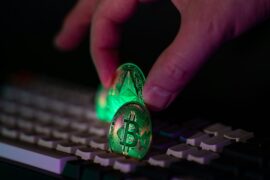This article may contain references to products or services from one or more of our advertisers or partners. We may receive compensation when you click on links to those products or services. Nonetheless, our opinions are our own.
The information presented in this article is accurate to the best of our knowledge at the time of publication. However, information is subject to change, and no guarantees are made about the continued accuracy or completeness of this content after its publication date.
- Pakistan’s Potential Move Toward Bitcoin and Decentralized Finance
- Introducing Decentralized Finance
- Opportunities for Financial Inclusion in Pakistan
- Opportunities and Challenges
- IMF Considerations and Global Context
- Pathways to Engagement for Interested Investors
- Frequently Asked Questions
- Possibilities for Financial Innovation
- Recommended Reads
Pakistan’s Potential Move Toward Bitcoin and Decentralized Finance

Bitcoin is increasingly recognized as a legitimate component of modern financial systems, attracting attention from both institutional investors and policymakers. Recent statements attributed to Bilal Bin Saqib, a noted advocate for cryptocurrency adoption, have ignited discussions about Pakistan possibly exploring opportunities in decentralized finance (DeFi) using Bitcoin holdings. While official confirmation of this initiative remains absent, the conversation underscores a growing curiosity about integrating digital assets into national economic strategies.
Introducing Decentralized Finance
Decentralized finance, or DeFi, represents a transformative approach to financial transactions by operating on blockchain networks without reliance on traditional intermediaries like banks or brokers. Instead, smart contracts automate lending, borrowing, and trading activities. DeFi platforms are designed to provide inclusive financial services, often reaching populations underserved by conventional banking systems.
Examples of DeFi applications include:
- Lending and borrowing protocols allowing individuals to earn interest or access capital
- Decentralized exchanges that facilitate peer-to-peer cryptocurrency trading
- Liquidity pools where assets are deposited to support market activities in exchange for returns
DeFi platforms primarily run on blockchains such as Ethereum, enabling transactions to occur securely, transparently, and with minimal intervention.
Opportunities for Financial Inclusion in Pakistan
A significant portion of Pakistan’s population remains unbanked or underbanked. DeFi could potentially open pathways for broader participation in financial markets, particularly in regions where access to conventional banking infrastructure is limited. By providing tools for savings, investments, and digital transactions, DeFi may support economic empowerment among diverse communities.
Potential advantages of embracing DeFi in Pakistan include:
- Facilitating microloans for entrepreneurs and small businesses
- Enabling secure, efficient remittance systems for overseas workers sending money home
- Encouraging savings and investments through easy-to-access financial platforms
These benefits could contribute to a more inclusive financial environment, stimulating local economies and reducing dependency on cash-based transactions.
Voted "Best Overall Budgeting App" by Forbes and WSJ
Monarch Money helps you budget, track spending, set goals, and plan your financial future—all in one app.
Get 50% OFF your first year with code MONARCHVIP
Opportunities and Challenges
Although the vision of deploying Bitcoin reserves in DeFi offers promising prospects, several considerations must be addressed:
Volatility Concerns
Bitcoin’s well-documented price fluctuations can present substantial risks if used as a treasury asset. Sudden market downturns could significantly diminish the value of reserves, complicating efforts to maintain fiscal stability.
Regulatory Ambiguities
Cryptocurrency regulations in Pakistan remain inconsistent, with prior statements from the State Bank of Pakistan cautioning against crypto trading. Any move toward deploying national assets into DeFi would require establishing clear regulatory guidelines to protect investors and maintain compliance with international standards.
Technological and Financial Literacy
Blockchain-based systems are vital for safe participation in DeFi. Without widespread education, there is a risk of misuse or exposure to scams, particularly among new users unfamiliar with digital assets.
IMF Considerations and Global Context
Global institutions, including the International Monetary Fund (IMF), have expressed caution regarding state-level cryptocurrency adoption, citing concerns over financial stability, regulatory compliance, and monetary sovereignty. Should Pakistan move forward with any plans involving Bitcoin reserves and DeFi protocols, engagement with global financial bodies would be necessary to align strategies with international best practices.
Pathways to Engagement for Interested Investors
Individuals interested in participating in Bitcoin and DeFi markets should approach cautiously, prioritizing education and risk management strategies. Steps to consider include:
- Researching cryptocurrency fundamentals and DeFi mechanisms
- Exploring reputable informational resources such as CoinDesk, Decrypt, or specialized blockchain education platforms
- Beginning with small-scale investments to gain familiarity with market dynamics
- Engaging with reliable DeFi platforms that have transparent security practices and established track records
Frequently Asked Questions
What has Bilal Bin Saqib stated about Bitcoin reserves?
Bilal Bin Saqib has advocated for exploring strategies involving Bitcoin and DeFi as avenues to modernize financial frameworks in Pakistan. However, there is no verified evidence that the Pakistani government holds Bitcoin reserves or has officially endorsed such plans.
How might DeFi benefit Pakistan’s economy?
DeFi could enhance financial inclusion, stimulate local economic activity, and introduce new channels for investment and growth, especially in regions where banking services are limited.
What are the main risks of using Bitcoin in DeFi?
Risks include high market volatility, regulatory uncertainties, and technical challenges related to secure participation in blockchain networks.
Is there any official policy from Pakistan regarding cryptocurrency?
As of now, Pakistan’s regulatory approach to cryptocurrencies remains cautious, with the State Bank of Pakistan previously advising against digital asset transactions pending comprehensive regulations.
Possibilities for Financial Innovation
While concrete details regarding Pakistan’s involvement in Bitcoin and DeFi remain speculative, the conversation highlights the growing interest in leveraging digital assets for economic progress. For any future initiatives, prioritizing transparent communication, regulatory clarity, and widespread financial education will be necessary to harness the benefits while managing potential downsides.

Reviewed and edited by Albert Fang.
See a typo or want to suggest an edit/revision to the content? Use the contact us form to provide feedback.
At FangWallet, we value editorial integrity and open collaboration in curating quality content for readers to enjoy. Much appreciated for the assist.
Did you like our article and find it insightful? We encourage sharing the article link with family and friends to benefit as well - better yet, sharing on social media. Thank you for the support! 🍉
Article Title: Pakistan Will Deploy Bitcoin Reserve in DeFi for Yield, Says Bilal Bin Saqib
https://fangwallet.com/2025/07/07/pakistan-will-deploy-bitcoin-reserve-in-defi-for-yield-says-bilal-bin-saqib/The FangWallet Promise
FangWallet is an editorially independent resource - founded on breaking down challenging financial concepts for anyone to understand since 2014. While we adhere to editorial integrity, note that this post may contain references to products from our partners.
The FangWallet promise is always to have your best interest in mind and be transparent and honest about the financial picture.
Become an Insider

Subscribe to get a free daily budget planner printable to help get your money on track!
Make passive money the right way. No spam.
Editorial Disclaimer: The editorial content on this page is not provided by any of the companies mentioned. The opinions expressed here are the author's alone.
The content of this website is for informational purposes only and does not represent investment advice, or an offer or solicitation to buy or sell any security, investment, or product. Investors are encouraged to do their own due diligence, and, if necessary, consult professional advising before making any investment decisions. Investing involves a high degree of risk, and financial losses may occur including the potential loss of principal.
Source Citation References:
+ Inspo
There are no additional citations or references to note for this article at this time.












































